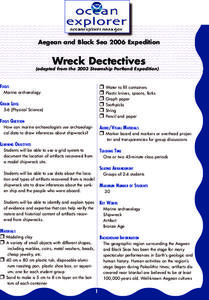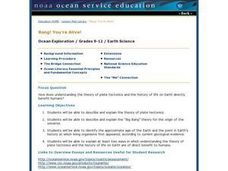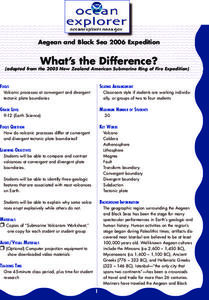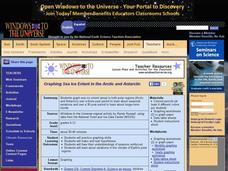Alabama Learning Exchange
Tornadoes
Students research tornadoes. For this weather lesson, students construct a KWL chart on tornadoes and view the video National Geographic-Tornadoes. Students discuss the facts they learned from the film and complete the KWL chart.
Curated OER
Where Does Water Come From: The Water Cycle
Students explore the water cycle. In this water cycle lesson, students read the book The Magic School Bus Wet All Over and summarize the steps of the water cycle. Students label a picture map of the water cycle.
Curated OER
It's Going to Blow Up!
Get your ocean explorers online, reading articles about submarine volcanoes. They answer a series of questions and take a geometery challenge in which they calculate how much of a volcano has been blown away. Make sure to explore several...
Wild BC
The Greenhouse Effect: The Role of CO2
Though this is meant to be second in a two-part activity, the two are not dependent on each other. Pupils play the roles of visible light rays, light or dark surfaces, and carbon dioxide molecules. They interact and react according to...
Curated OER
Physical Changes and the Water Cycle - Three
Third graders observe and reproduce the water cycle in their very own classroom. A simple, yet very effective, demonstration on how water evaporates is observed by the young scientists. They make observations and sketches in their...
Curated OER
Get the Drift?
The anticipatory set is clever: give groups five minutes to work on the puzzle and then discuss what strategies they used to match the few that connected. This introduces middle schoolers to the concept of continental drift. A portion of...
Curated OER
Top to Bottom
Marine science classes read about the 2005 North Atlantic Stepping Stones Expedition and review climate change. They use maps to locate the seamount chains. In collaborative groups, they research how climate change may be altering the...
Curated OER
Where Am I?
Extensive background on marine navigation is provided for you as the teacher. Assign groups to research marine navigation techniques and construct astrolabes. Resource links are listed for extension ideas. If you are teaching an...
Curated OER
Wreck Detectives
Junior archaeologists examine types of artifacts from the Bronze Age on the internet. In collaborative groups, they create a story about a ship from this period and then construct a model of the ocean floor after their ship has sunk....
Smithsonian Institution
Watching Crystals Grow
Amazing science can sometimes happen right before your eyes! The class gets cozy as they watch crystals grow. They use Epsom salts, rocks, and food coloring to create crystals. They'll observe the entire process, documenting every step...
Curated OER
Rock of Ages
Students are given a classification table and samples from their location. They locate their samples on the classification table using the characteristics used in rock identification.
Curated OER
Mantle Motions
Learners define vocabulary words associated with lithospheric plate motions. They create and write down a motion to act out each vocabulary word, and participate in a game of demonstrating the actions associated with each word.
Curated OER
Detectives in the Landscape
Fourth graders explore landscapes. In this landscape lesson, 4th graders investigate different elements of landscapes. Students design a visual presentation using photographs taken during a nature walk.
Curated OER
Bang! You're Alive
Students explore the Big Bang Theory and the Theory of Plate Tectonics. In this history of life lesson, students explain two ways the Theory of Plate Tectonics and the Big Bang are of direct benefits to humans.
Curated OER
It's Going to Blow Up!
Students discover the major characteristics of volcanoes on the Pacific Ring of Fire. They describe the processes that produce the "Submarine Ring of Fire." students explain the factors that contribute to explosive volcanic eruptions.
Curated OER
Exploring Explorations
Learners describe human benefits from ocean exploration. In this ocean exploration instructional activity, students focus on the historical, biological, and physical features of the deep oceans and man's exploration.
Curated OER
What's the Difference?
Students investigate volcanic processes at convergent and divergent
tectonic plate boundaries. They read and analyze diagrams, complete a worksheet, and write an essay.
Curated OER
Science:Effects of Weathering
Seventh graders take an outdoor observation walk around the campus and take soil samples. Working in groups , they conduct experiments with rocks and soil that demonstrate the effects of different types of erosion.
Curated OER
Keeping Watch on Coral Reefs
High schoolers investigate the dangers Coral Reefs face by investigating satellite images. In this environmental protection lesson, students utilize the Internet to discover the types of satellites and sensors used to provide...
Curated OER
Is the Hudson River Too Salty to Drink?
Learners explore reasons for varied salinity in bodies of water. In this geographical inquiry lesson, students use a variety of visual and written information including maps, data tables, and graphs, to form a hypothesis as to why the...
Curated OER
River System
Fifth graders explore the parts of a river system and understand the importance of each part. For this river system lesson, 5th graders diagram a river system and write a paragraph explaining its parts.
Curated OER
Graphing Sea Ice Extent in the Arctic and Antarctic
Students graph sea ice data and predict long term trends in the data. In this climate change lesson, students use sea ice data from the Arctic and Antarctic to construct line graphs. They use their graphs to predict the effects of global...
Curated OER
Moh's Scale of Hardness
Students investigate how to use Moh's Hardness Scale. In this geology activity, students examine several minerals and develop a hypothesis about which mineral is the hardest. Students use the Moh's Scale Identification Chart to determine...
Curated OER
Satellite Sense
Students look at data to understand how it is interpreted by scientists. In this satellite sense lesson plan, students complete worksheets based on radar and satellite images. Students work in groups of two to diagram a landform.

























